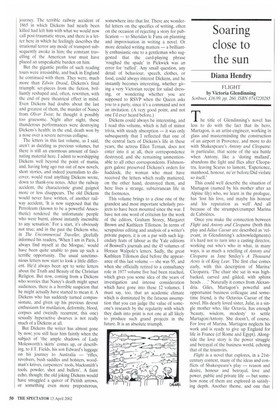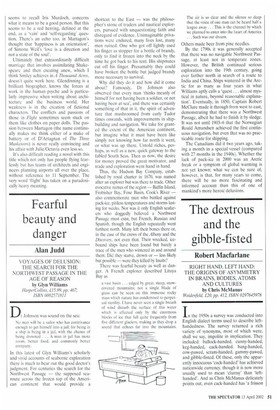Soaring close to the sun
Diana Hendry
FLIGHT by Victoria Glendinning Scribner, £16.99, pp. 260, ISBN 0743220285 The title of Glendinning's novel has less to do with the fact that its hero, Martagon, is an artist-engineer, working in glass and masterminding the construction of an airport in Provence, and more to do with Shakespeare's Antony and Cleopatra: in particular, that scene of the sea battle when Antony, like a 'doting mallard', abandons the fight and flies after Cleopatra, leaving Scarus to lament, 'Experience, manhood, honour, ne'er before/Did violate so itself.'
This could well describe the situation of Martagon (named by his mother after an Alpine lily) who, we learn in the prologue, has 'lost his love, and maybe his honour and his reputation as well'. And all because of the strumpet/crumpet Marina de Cabrieres.
Once you make the connection between Flight and Antony and Cleopatra (both this play and Julius Caesar are described as 'relevant, in Glendinning's acknowledgments) it's hard not to turn into a casting director, working out who's who in what, in many ways, is as much a retelling of Antony and Cleopatra as Jane Smiley's A Thousand Acres is of King Lear. The first clue comes early, with this description of Marina/ Cleopatra. 'The chair she sat in was highbacked, carved and gilded, with sphinx heads . . .' Naturally it comes from Alexandria. Giles, Martagon's powerful and opportunist business colleague and sometime friend, is the Octavius Caesar of the novel. His dearly loved sister, Julie, is a single mother who, like Octavia, has enough 'beauty, wisdom, modesty' to settle Martagon/Antony. She doesn't, of course. For love of Marina, Martagon neglects his work and is ready to give up England for life in France (cf Rome and Egypt). Alongside the love story is the power struggle and betrayal of the business world, echoing that of the triumvirs.
Flight is a novel that explores, in a 21stcentury context, many of the ideas and conflicts of Shakespeare's play — reason and desire, honour and betrayal, love and power, public and private life — but somehow none of them are explored in satisfying depth. Another theme, and one that
seems to recall Iris Murdoch, concerns what it means to be a good person. But this seems to be a red herring, defined at the end, as a 'vain and 'self-regarding' question, There's an echo too, in Martagon's thought that 'happiness is an orientation', of Simone Weil's 'love is a direction and not a state of the soul'.
Ultimately that extraordinarily difficult marriage that involves assimilating Shakespeare and then creating anew, which I think Smiley achieves in A Thousand Acres, doesn't quite work here. Glendinning is a brilliant biographer, knows the forces at work in the human psyche and is particularly impressive when writing about architecture and the business world. Her weakness is in the creation of fictional characters. The conflicts and passions of those in Flight sometimes seem stuck on them like clothes on paper dolls. The passion between Martagon (the name continually makes me think either of a make of battery or of D'Artagnan of The Three Musketeers) is never really convincing and his affair with JulielOctavia even less so.
It's also difficult reading a novel with this title which not only has people flying fearlessly but has teams of architects and engineers planning airports all over the place, without reference to 11 September. The very word 'flight' has taken on a paradoxically hea.1.5, meaning.



















































































 Previous page
Previous page